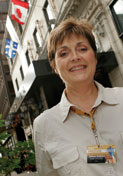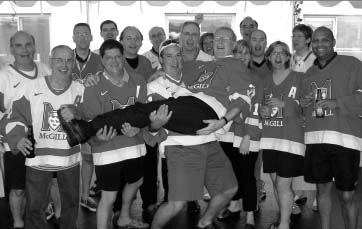In focus
Johanne Bellefleur: Red carpet treatment at Film Festival

Johanne Bellefleur outside the Imperial Theatre during the World Film Festival.
Owen Egan
For 22 years, Johanne Bellefleur has slogged it out in the auditorium trenches of the Montreal World Film Festival. Twenty-two years of getting up early to stand in lines. Twenty-two years of squeezing in five or six films a day — 55 or 60 over the course of each festival. Twenty-two years of sticky floors, soundtracks and subtitles. Twenty-two years without a single missed day, a true cinematic foot soldier if ever there was one.
But a funny thing happened to Bellefleur at this year's festival. She took no early wake-up calls, showing up just minutes before each film. And when she did arrive, she was whisked past long lines of her fellow cinephiles (whom she lovingly refers to as "my colleagues") and given a prime seat up front. That's because, this year, Bellefleur sat on the festival's main jury.
In an effort to reach out to regular movie-goers, organizers of the festival announced that they were going to make history by inviting a member of the general public to sit on the jury. Bellefleur, who schedules her vacation from her job as personnel officer in McGill's Human Resources around the festival, threw her hat into the ring. In her application, Bellefleur wrote that, for her, cinema represents a means to travel the world and to learn how emotions are expressed across the continents. Faster than you could say "Lights! Camera! Action!" Bellefleur had earned the exclusive gig.
The seven-member jury was studded with international stars, including Chilean director Silvio Caiozzi, French actress Anna Karina and legendary Greek director Theo Angelopoulos. "These people are giants in their industry," says Bellefleur. "They are in the spotlight at Cannes while I'm usually sitting in the dark watching movies," she laughs. "But they were so nice and welcoming. I think they were really happy to have someone from the public with them."
And why shouldn't they be? This is a woman who takes her movie-watching so seriously that she doesn't eat in the theatre lest she be distracted from the experience. Bellefleur also eschews reviews and plot summaries. "I have to be fresh" she explains. "All the director has to do is come and get me because I'm so open to receiving the movie."
"For a movie to make that connection with me it has to have an intelligent story, good acting and a nice balance of humor and drama," she explains. "Personally, I go to movies because of the director, and I prefer Italian directors above all. They tell such wonderful, complete stories." Among her favourite films, she lists The Godfather, Cinema Paradiso and Bertolucci's 1900.
Jury duty meant seeing the festival in a whole new light. She used to spend 12 hours poring over festival schedules and city maps in order to create a master grid that coordinated movie times, cinema locations and transit schedules. Downtime was bad time. If she wasn't watching a movie, she was on her way to see one.
Regularly, she would show up 90 minutes early to the first films of the day. That way, she could snag a much-coveted aisle seat. An aisle seat meant a quick get-away — Bellefleur was usually out of the cinema before the house lights were warm. Every minute trapped at the back of a herd of slow moving people was another cinematic gem lost forever, another scene unseen. "Don't forget," Bellefleur says, "for every film you watch, you're missing six or seven."
This year, however, the downtime was almost as fun as the movies. Between films, the jurors were treated like royalty, going on excursions, meeting Mayor Tremblay and attending press conferences. She says her main concern was trying not to trip on the red carpets.
In all, the jury screened a total of 22 films in 11 days and, in the end, handed out 10 prizes. Angelopoulos led the deliberations, which Bellefleur says were "absolutely wonderful," and then everyone voted. This year the Grand Prix of the Americas went to Off Screen by Pieter Kuijpers of the Netherlands/Belgium. "It is based on an actual hostage-taking in Amsterdam," says Bellefleur. "It is such a powerful movie and well-deserving of the award." She also personally presented the prize for Best Screenplay to José Corbacho and Juan Cruz for the film Tapas.
In the end, Bellefleur is thankful to have had the opportunity to serve on the jury. "This was such a tremendous experience," she says. "I just hope they continue it so that other people can enjoy it too. Flowers in the hotel room, the red carpet — I could get used to this lifestyle," she admits with a laugh. Then she pauses for a moment before adding "Of course, I didn't see that many movies this time. It will be nice to be back next year with my grid."
Bob Dubeau hangs 'em up
Ask Bob Dubeau, former director of athletics who slipped into retirement on August 31, what his very favorite moment in McGill sporting history is and he doesn't hesitate. "Winning the Vanier Cup in 1987. The students were behind the team, the faculty was behind the team and the whole city was behind the team. The feeling was electric. I don't know if the spirit around campus has ever been that high — before or since."
Dubeau's 29 years as director of his 36 at McGill will be remembered for his dedication to making McGill's athletics department one of the best in the country. Under his leadership, the university's athletics budget has increased substantially and the number of its elite intercollegiate teams has grown from 21 to 49.
Surprisingly, when listing some of his favourite programs, one of the first out of his mouth is the university's Children's Sports Camp. "It's been going on for about 20 years now, and it's just a great community program. We get about 500 kids a day for eight weeks and we get jobs for some 100 McGill students. What could be better than that?"
However, when it comes to accomplishments, Dubeau saved his best — and most ambitious — for last. "Without a doubt, the thing I am most proud of is the renovations of our sports facilities. Slated for completion in mid-September, the $60 million dollar project will dramatically expand what had been woefully inadequate facilities. "Arguably, we now have the best university facilities in the nation."

At the annual CIS congress, held on June 10 in Aylmer, Quebec, Bob Dubeau is manhandled by fellow Athletic Directors and colleagues from rival universities. In a show of sportsmanship they all donned McGill hockey jerseys.
Courtesy of McGill Athletics

